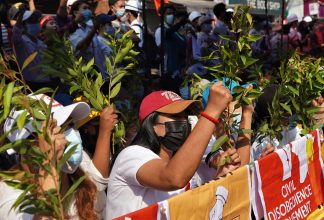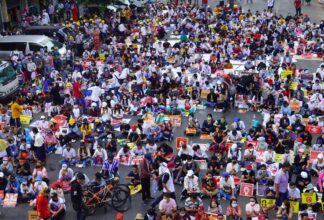Myanmar Must Investigate Destruction of Religious Buildings
In a joint statement today, 5 July, Civil Rights Defenders and 18 other non-governmental organisations in Myanmar call on the Government of Myanmar to conduct a formal investigation into the recent destruction of religious buildings in Kachin State and Bago Region. The statement represents a collective show of support from Myanmar civil society for victims of religiously motivated violence in the country.
Myanmar: Investigate Destruction of Religious Buildings
On July 1, a violent assembly of people destroyed a Muslim prayer hall in Lone Khin village, Kachin State, and on June 23, a similar mob of people destroyed a mosque in Thaye Thamain village, Bago Region. In each of these cases, the authorities failed to hold perpetrators accountable.
“We expect the authorities to thoroughly and impartially investigate these crimes and ensure those responsible are held to account,” said Khon Ja, an ethnic Kachin activist in Myanmar. “We don’t want to see more of this violence. The culture of impunity in Myanmar must come to an end.”
At approximately 3:30 pm on July 1, a group of people burned down a Muslim prayer hall in Lone Khin village in Kachin State’s Hpakant Township. Last month, local Buddhist nationalists reportedly demanded that the Muslim community destroy the hall. After the Muslim community failed to heed the nationalists’ order, a violent mob burned the structure to the ground and obstructed the work of fire fighters.
Following the incident, local authorities restricted access to a bridge leading to Lone Khin village and telecommunications in the area appeared to have been cut. At present, no arrests have been made.
“The people of Myanmar elected the National League for Democracy on the basis of its campaign to uphold rule of law and human rights for all,” the statement reads. The 19 signatory organisations, including groups from Kachin State, Mandalay Region, and Yangon Region, “call on the Government of Myanmar to deliver on its promise.”
The destruction of the prayer hall in Lone Khin occurred just eight days after a similar attack on a Muslim religious compound in Bago Region in central Myanmar.
On June 23, following a disagreement over a Facebook post, a group of people damaged several buildings and destroyed a mosque in Thaye Thamain village, Bago Region. Local resident Abdul Rashid reportedly sustained injuries to his waist and head. Following the attack, many Muslim residents fled Thaye Thamain.
On June 29, Bago Region Chief Minister Win Thein declared that no legal action would be taken against the perpetrators of the violence in Thaye Thamain village. Win Thein told the Myanmar Times, “If we take action on people, the situation will be bad.” He added that the regional government would “supply aid to the Muslim people who suffered in the quarrel.”
“We appreciate the new government and its reconciliation approach, which is an improvement upon the ways of the previous government,” said Harry Myo Lin, executive director at Seagull. “However, it’s essential that the authorities hold the perpetrators accountable and take proactive steps to deter more violence. We’ve recently seen a lot of unmitigated incitement to religious violence online and offline.”
These recent violent incidents were not isolated events and reflect unchecked religious tension in Myanmar. A recent report to the United Nations Human Rights Council by the U.N. Office of the High Commissioner for Human Rights details systemic human rights violations against religious minorities in Myanmar. The report points to the responsibility of the government to halt abuses against minorities and break the ongoing cycle of impunity.
“These acts of religious extremism aren’t spontaneous,” said Matthew Smith, chief executive officer at Fortify Rights. “The government needs to roll out a concerted effort to protect religious freedom and prevent future outbreaks of violence. It’s the duty of everyone in Myanmar to ensure that communities of all faiths can practice their religion with freedom from fear.”
Article 18 of the Universal Declaration of Human Rights protects the right to freedom of religion. States are further obligated to protect the rights of persons belonging to minority groups, including religious minorities, in line with the fundamental principles of equality and non-discrimination under international law.
“Myanmar’s human rights obligations require the authorities to protect at-risk religious groups,” said Shaivalini Parmar, Myanmar Programme Officer at Civil Rights Defenders. “It’s time for the government to stand up for religious minorities and take action against those perpetrating attacks.”

